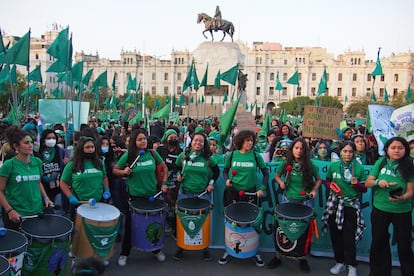Peru denies abortion to girl raped by her stepfather
The United Nations have called on the government to reconsider the case of the 11-year-old, which comes just two months after a 13-year-old rape victim was also prevented from ending her pregnancy

In mid-June, the United Nations Committee on the Rights of the Child (CRC) issued a historic ruling: it found that the Peruvian state violated the rights of a 13-year-old indigenous girl called Camila (pseudonym), who was the victim of incest and rape, by not providing her with information on or access to legal and safe abortion. In the resolution, the CRC urged Peru to decriminalize abortion in all cases of child pregnancy and to amend the regulations governing access to therapeutic abortion to provide for its specific application to girls. It also called for the creation of a cross-cutting mechanism to ensure that victims are not retraumatized. Two months later, a very similar case shows that the Peruvian government has not heeded these calls.
In this new case, the girl in question is 11 years old and is called Mila — not only to protect her identity, but also to make it clear that her rights have been violated just like Camila’s. Mila comes from a humble area of Iquitos, the capital of the department of Loreto, which is a gateway to the Amazon Rainforest. She has been systematically abused by her stepfather since she was six, and a month ago, she found out that she was 13 weeks pregnant. Her stepfather was detained, but the judicial system declared the request for preventive detention was unfounded and released him. As for Mila, the Loreto Special Protection Unit (UPE) decided to send her to a shelter, reportedly to protect her from her family. Her three siblings, one of who is just fourth months old, were also sent to the shelter. Mila’s mother, who wished to remain anonymous, said she was also a victim of her partner. She claimed that she was not able to help her daughter because he threatened to kill her.
“I was afraid, because he threatened me, he shut the door on me. When I wanted to go out, he told me: ‘If you tell the neighbors, I’m going to kill you, and I’m going to run off.’ When I talk about him, I am afraid. I have nightmares,” the mother told the investigative TV program, Epicentro TV. The mother said that she requested a therapeutic abortion for Mila, but that the UPE did not activate the protocol and, as a result, did not provide them with the necessary information.
That was when the Center for the Promotion and Defense of Sexual and Reproductive Rights (Promsex) took on the mother’s legal defense. The UPE referred Mila to the Regional Hospital of Loreto, so that its board of doctors could decide whether Mila — who hasn’t even finished primary school — could access a therapeutic abortion. On August 3, the board decided that Mila should continue with the pregnancy, arguing that the 11-year-old had told them that she wanted to have the baby and that rape cases are not included in the therapeutic abortion protocol. According to the United Nations Population Fund (UNFPA), girls under 15 years of age are three times more likely to die from pregnancy-related causes than women over 20.
Promsex managed to get Mila’s case looked at again: the Ministry of Women and Vulnerable Populations has confirmed that a new medical board will review Mila’s case to determine whether or not she is allowed to end her pregnancy. “I want it taken out of her womb. I do want to see my daughter, but I don’t want to see that baby because it has hurt my daughter,” said the mother.
The Peru mission of the Office of the United Nations High Commissioner for Human Rights (UNHCR), UNFPA, U.N. Women and other organizations issued a joint statement to express their deep concern over Mila’s case and call on the Peruvian government for action. “We urge you to reconsider the decision to deny her access to therapeutic abortion and guarantee Mila, and all pregnant girls and teenage victims of sexual violence, this right — with safe and age-appropriate procedures — and within 22 weeks of gestation, as established by medical protocol [...] We remind you that forced maternity resulting from rape is not voluntary, and threatens integral health.”
According to the Women’s Emergency Centers, 4,031 cases of sexual violence have been seen so far this year. In 2020, 4,238 cases were registered. According to the Peruvian newspaper El Comercio, 1,100 girls under the age of 15 become mothers every year. The horror that Mila and Camila have experienced is unfortunately not an exception, but rather an ongoing drama.
Sign up for our weekly newsletter to get more English-language news coverage from EL PAÍS USA Edition
Tu suscripción se está usando en otro dispositivo
¿Quieres añadir otro usuario a tu suscripción?
Si continúas leyendo en este dispositivo, no se podrá leer en el otro.
FlechaTu suscripción se está usando en otro dispositivo y solo puedes acceder a EL PAÍS desde un dispositivo a la vez.
Si quieres compartir tu cuenta, cambia tu suscripción a la modalidad Premium, así podrás añadir otro usuario. Cada uno accederá con su propia cuenta de email, lo que os permitirá personalizar vuestra experiencia en EL PAÍS.
¿Tienes una suscripción de empresa? Accede aquí para contratar más cuentas.
En el caso de no saber quién está usando tu cuenta, te recomendamos cambiar tu contraseña aquí.
Si decides continuar compartiendo tu cuenta, este mensaje se mostrará en tu dispositivo y en el de la otra persona que está usando tu cuenta de forma indefinida, afectando a tu experiencia de lectura. Puedes consultar aquí los términos y condiciones de la suscripción digital.









































